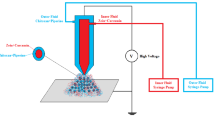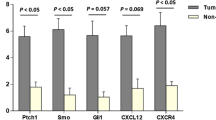Abstract
Purpose
Vast therapeutic traits and very low toxicity of curcumin compound have made it and related formulations promising for treatment purposes. The aim of this study was the assessment of dendrosome curcumin (DNC) inhibitory effects on breast cancer therapy compared to single curcumin compound.
Methods
DNC was synthesized and MCF-7 cells were prepared. The cultured cells were treated with 20 μg/ml and 25 μg/ml of DNC. Real-time quantitative PCR (RT-qPCR) was performed to measure the expression of FOXCUT and MEG3 genes. Additionally, flow cytometry was applied to measure cell death rate and apoptosis.
Results
The results outlined that DNC enhanced the MEG3 gene expression significantly higher than the control. Furthermore, DNC was associated with a significant decrease in the expression of FOXCUT gene as compared to the control. The application of DNC in the MCF7 cell line enhanced cell death and reduced necrosis.
Conclusions
The rate of apoptosis (programmed cell death) was enhanced, but necrosis was decreased in treated cancer cells compared to those treated with single curcumin. Accordingly, the DNC can be applied to hinder the growth and dissemination of cancer cells as a preferred approach to reduce the complications of other strategies such as chemotherapy and radiation therapy. Indeed, we concluded that DNC enhanced the expression of MEG3, a tumor suppressor, at 25 μm dose, but reduced the expression of the FOXCUT gene, possibly via the methylation of the gene. Thereby, DNC exerted a promising tumor inhibitory growth potential for the eradication of cancer cells.


Similar content being viewed by others
References
Torre LA, Bray F, Siegel RL, Ferlay J, Lortet-Tieulent J, Jemal A. Global cancer statistics, 2012. CA Cancer J Clin. 2015;65(2):87–108.
McGuire S. World cancer report 2014. Geneva: World Health Organization, International Agency for Research on Cancer, WHO Press, 2015: Oxford University Press; 2016.
Carioli G, Malvezzi M, Rodriguez T, Bertuccio P, Negri E, La Vecchia C. Trends and predictions to 2020 in breast cancer mortality: Americas and Australasia. Breast. 2018;37:163–9.
Tyanova S, Albrechtsen R, Kronqvist P, Cox J, Mann M, Geiger T. Proteomic maps of breast cancer subtypes. Nat Commun. 2016;7:10259.
Xu Y-z, Chen F-f, Zhang Y, Zhao Q-f, Guan X-l, Wang H-y, et al. The long noncoding RNA FOXCUT promotes proliferation and migration by targeting FOXC1 in nasopharyngeal carcinoma. Tumor Biol. 2017;39(6):1010428317706054.
Sreekutty J. Possible mechanism of action of albumin conjugated curcumin on lung cancer cells. Thiruvananthapuram: SCTIMST; 2017.
Yalameha B. Administration of herbal antioxidant to prevent and treatment of cancers. Ann Res Antioxid. 2018;3(1).
Nadaf SJ, Killedar SG. Curcumin nanocochleates: use of design of experiments, solid state characterization, in vitro apoptosis and cytotoxicity against breast cancer MCF-7 cells. J Drug Deliv Sci Technol. 2018;47:337–50.
Khosropanah MH, Dinarvand A, Nezhadhosseini A, Haghighi A, Hashemi S, Nirouzad F, et al. Analysis of the antiproliferative effects of curcumin and nanocurcumin in MDA-MB231 as a breast cancer cell line. Iran J Pharm Res. 2016;15(1):231.
Mukerjee A, Ranjan AP, Vishwanatha JK. Targeted nanocurcumin therapy using Annexin A2 antibody improves tumor accumulation and therapeutic efficacy against highly metastatic breast cancer. J Biomed Nanotechnol. 2016;12(7):1374–92.
Arora R, Kuhad A, Kaur I, Chopra K. Curcumin loaded solid lipid nanoparticles ameliorate adjuvant-induced arthritis in rats. Eur J Pain. 2015;19(7):940–52.
Brantl S. Regulatory mechanisms employed by cis-encoded antisense RNAs. Curr Opin Microbiol. 2007;10(2):102–9.
Mattick JS, Rinn JL. Discovery and annotation of long noncoding RNAs. Nat Struct Mol Biol. 2015;22(1):5–7.
Guo W, Dong Z, Shi Y, Liu S, Liang J, Guo Y, et al. Aberrant methylation-mediated downregulation of long noncoding RNA LOC100130476 correlates with malignant progression of esophageal squamous cell carcinoma. Dig Liver Dis. 2016;48(8):961–9.
Dhamija S, Diederichs S. From junk to master regulators of invasion: lncRNA functions in migration, EMT and metastasis. Int J Cancer. 2016;139(2):269–80.
Jiang C, Li X, Zhao H, Liu H. Long non-coding RNAs: potential new biomarkers for predicting tumor invasion and metastasis. Mol Cancer. 2016;15(1):62.
Sannigrahi M, Sharma R, Panda N, Khullar M. Role of non-coding RNA s in head and neck squamous cell carcinoma: a narrative review. Oral Dis. 2018;24(8):1417–27.
Saadipoor A, Razzaghdoust A, Simforoosh N, Mahdavi A, Bakhshandeh M, Moghadam M, et al. Randomized, double-blind, placebo-controlled phase II trial of nanocurcumin in prostate cancer patients undergoing radiotherapy. Phytother Res. 2018;33(2):370–378 https://doi.org/10.1002/ptr.6230..
Xie M, Fan D, Zhao Z, Li Z, Li G, Chen Y, et al. Nano-curcumin prepared via supercritical: improved anti-bacterial, anti-oxidant and anti-cancer efficacy. Int J Pharm. 2015;496(2):732–40.
Acknowledgments
This study was supported by College of Education for Pure Sciences, Kerbala University, Biology Department, Iraq.
Author information
Authors and Affiliations
Corresponding author
Ethics declarations
Conflict of Interest
The authors declare that they have no conflict of interest.
Additional information
Publisher’s Note
Springer Nature remains neutral with regard to jurisdictional claims in published maps and institutional affiliations.
Rights and permissions
About this article
Cite this article
Alghanimi, Y.K., Ghasemian, A. Inhibitory Traits of Dendrosome Curcumin (DNC) on Breast Cancer Compared to Curcumin Single Compound. J Gastrointest Canc 51, 527–533 (2020). https://doi.org/10.1007/s12029-019-00273-2
Published:
Issue Date:
DOI: https://doi.org/10.1007/s12029-019-00273-2




